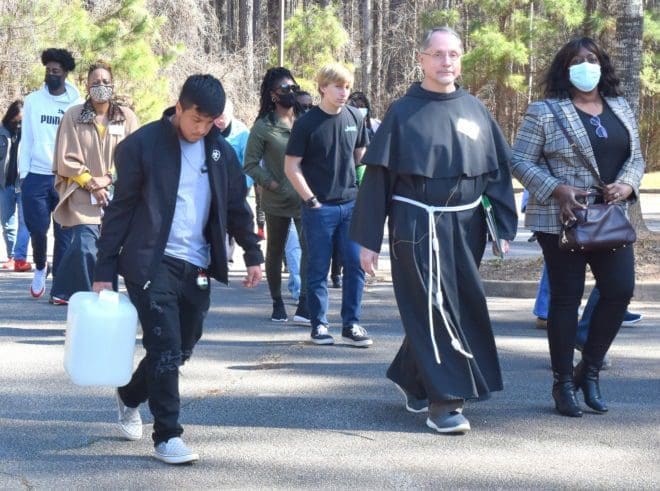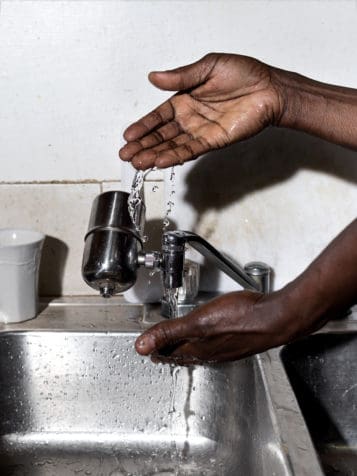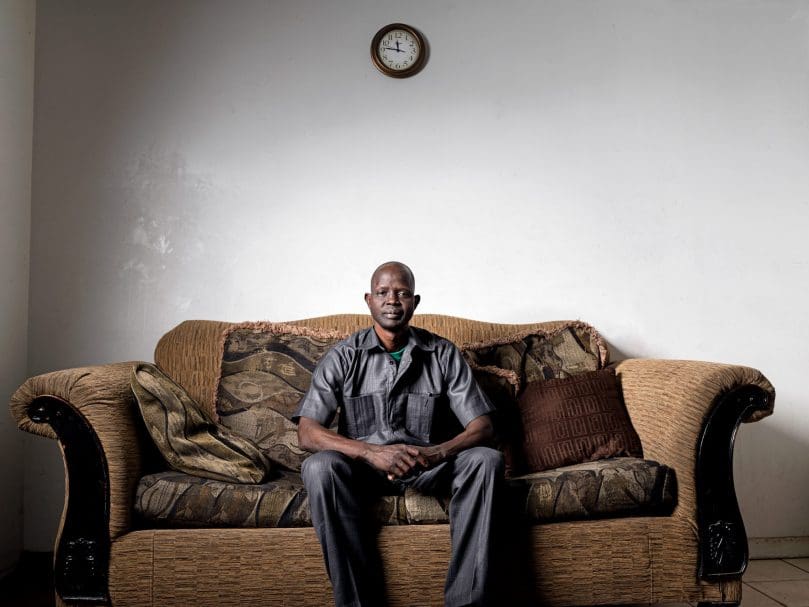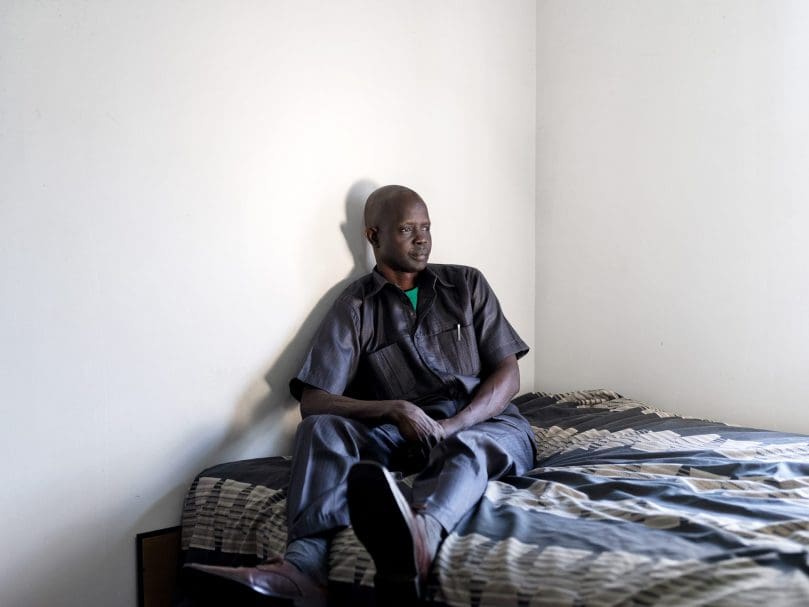Majok Marier escaped the war in South Sudan in 1987 and founded Wells for Hope to construct drinking wells for villages there. He spoke at “I Thirst,” a Feb. 26 program ahead of the Lenten season at St. Philip Benizi Church, Jonesboro. Marier is photographed at his home in Clarkston. Photo by Johnathon Kelso
Jonesboro
A community reflects on thirst, both physical and spiritual
By ANDREW NELSON, Staff Writer | Published March 4, 2022
JONESBORO—A jerry can of 44 pounds of water was hauled by young and old during a walk on the campus of St. Philip Benizi Church in solidarity with African women and girls who must haul as many as four of these jugs for hours to bring drinking water to their villages.
For Althea Fletcher, it was enough to break her heart. The jug was so heavy, so imagining young girls doing it daily weighs on you, she said.
In the parish’s “I Thirst” program on Feb. 26, about 50 people had a chance to reflect on the plight of people living in areas without access to clean drinking water while sharing their faith before the start of the Lenten season.

Moises Cedano carries a 44-pound jerry can as part of a Lenten program to increase awareness of the need for safe drinking water in South Sudan. It’s often young girls and women, walking for miles, who are tasked to carry as many as four of these jugs to provide water for their families. Beside Cedano are Franciscan Father John Koziol, pastor of St. Philip Benizi, and Princess Sumler. Photo by Susan Douglas
On an ornamental waterfall in the gathering space, people pinned sticky notes with their heart’s desires. In black ink, some wrote “justice for our people on racism,” another signed “knowledge and understanding” and another, “I hope to have strength and reaching my goal to finish school.”
In front of the masked congregation, Majok Marier shared his story of escaping the war in South Sudan in 1987, which began a 1,000-mile trek as one of the Lost Boys of Sudan. His village was left in ruins as war erupted, and he fled. For nearly 14 years, he searched for safety.
The group traveled in the cool of night, at the risk of facing bandits and lions. Grain and grass were their food. He sought shelter in refugee camps in Kenya and Ethiopia, fleeing revolutions and upheaval in East Africa.
“I didn’t say goodbye to my parents or to anybody,” he said. “It was a nightmare because it was difficult challenges. You had no hope.”
Marier settled in Clarkston in 2001 as a refugee. His profession as a plumber’s apprentice provides for his family in Sudan.
At his first return home in 2008, his grandmother dubbed him and his fellow Lost Boys the “seed of South Sudan” because they are the new start for the country.

Majok Marier runs his fingers through clean water at his home in Clarkston. Marier spoke about his safe drinking water project for South Sudan at a Feb. 26 event at St. Philip Benizi Churcy in Jonesboro. Photo by Johnathon Kelso
The Republic of South Sudan was founded in 2011, making it the world’s newest country. However, the people continue to be plagued by violence, with millions in need of humanitarian assistance.
When his sister died from lack of health care, he was moved to act. Marier founded a nonprofit organization for his native country called Wells for Hope in South Sudan to build drinking wells for villages.
According to UNICEF, nearly 60 percent of the country lacks access to safe drinking water.
Marier’s organization has drilled six wells since its first in 2015. The drinking-water wells cut hours spent collecting unsafe river water, in addition to helping local agriculture by refreshing crops during droughts. It allows children to attend school. With a reliable source of safe water, medical clinics and other development can take place.
The pandemic interrupted his fundraising but he hopes by 2023 to construct two more wells. To tap groundwater costs an estimated $15,000, he said. He oversees the work when he returns there, visiting his young family of five children.
The deepest thirst
For the Fletchers, the talk and short journey around the St. Philip Benizi campus reminded them of when their family was young. Eric Fletcher said his youngest son was just born when a hurricane knocked out power and water for time. He said he had to walk a mile to get water, but it was only for a short duration. The idea of walking day after day without an end in sight for fresh water is daunting, he said.
Walking the parish campus, with one volunteer carrying the water can, seven speakers offered spiritual reflections, touching on the thirsting for God and Lent.
“Many people thirst for peace and justice, many for love and acceptance, many for a place to live and to prosper. The list goes on and on. We invite you to think about your deepest thirst. Ultimately, we all thirst for God who is the source and sustainer of all life,” said Franciscan Father John Koziol.
The priest encouraged the community to pray for the gift of the Holy Spirit that transforms lives and enables the community to aid “the lives of all who thirst.”
Mabel Swaby, a member of the First Baptist Church of Jonesboro, said she counted 43 times thirst is mentioned in the Bible. In faith, we desire more than a drink to fill us, she said.
“We thirst for togetherness; we thirst for community. It’s so many things going on right now that the most important thing that we can thirst for is Jesus, more of Jesus, more of us obeying Jesus,” she said.
It seems at this particular time, there is more division in our country than in the past, she said. “Let’s thirst more for love of one another,” said Swaby.
From Crestview Baptist Church in Griffin, member Rock Stubbs encouraged people to take up the Gospel by asking others, “Has anyone ever shared with you just how much God loves you?” It can be an avenue to share the faith “with love, to challenge people to experience the great love (God) has,” he said.
To learn more, visit wellsforhopeforsouthsudan.org.

